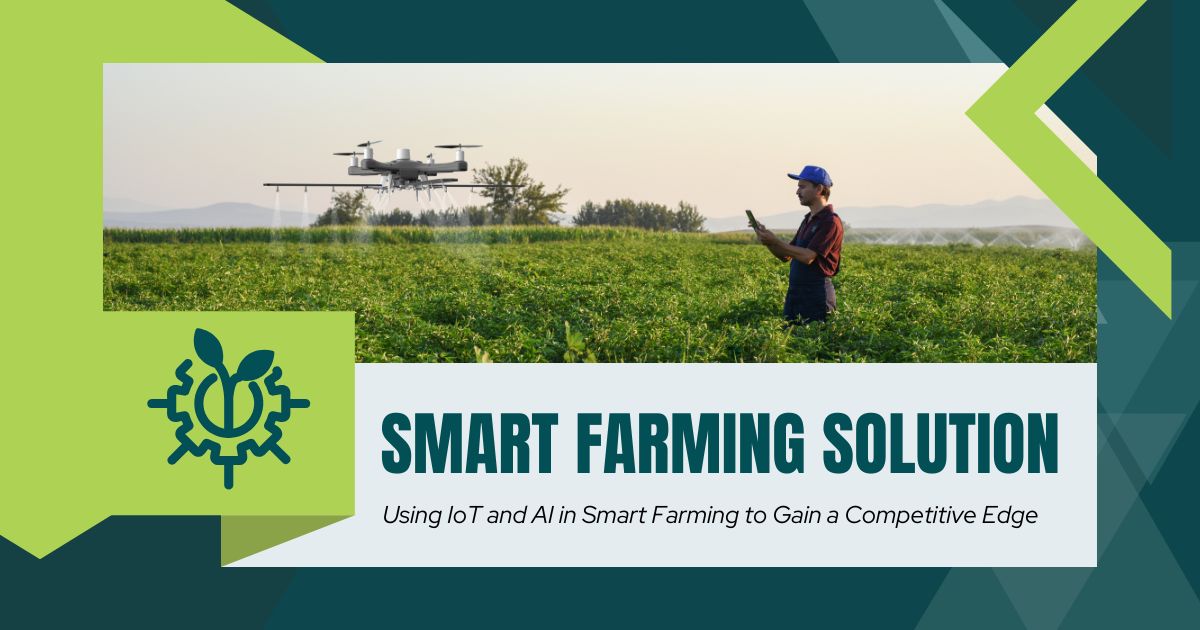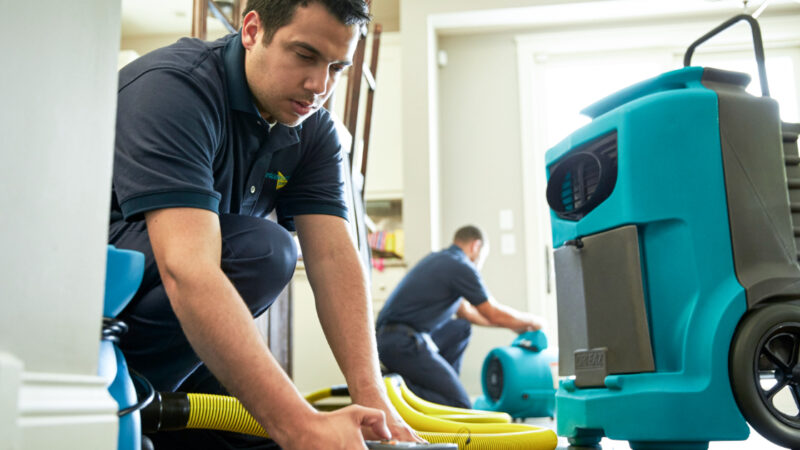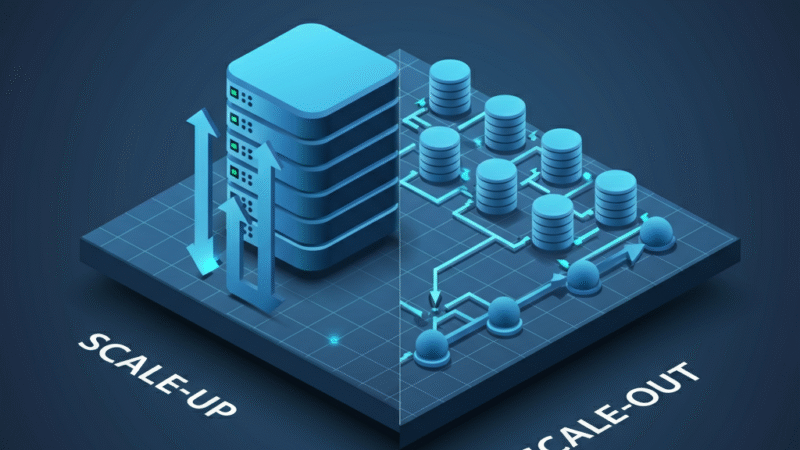Using IoT and AI in Smart Farming to Gain a Competitive Edge

Agriculture is undergoing a digital transformation with IoT (Internet of Things) and AI (Artificial Intelligence) at its core. According to MarketsandMarkets, the global smart agriculture market is projected to grow from $13.7 billion in 2020 to $22 billion by 2025. This surge highlights how farms are adopting digital tools to improve productivity, reduce costs, and increase sustainability.
Farmers now leverage data-driven insights from connected devices and AI algorithms to make better decisions. Smart Farming Solutions offer a competitive edge by automating tasks, optimizing resource usage, and predicting future outcomes. A Smart Agriculture Solution Company plays a crucial role in delivering these technologies to the agriculture sector.
What is Smart Farming?
Smart Farming refers to using advanced technologies like IoT sensors, AI-powered analytics, drones, and robotics in agricultural practices. It enables precision farming, where decisions are based on real-time data about soil conditions, weather patterns, crop health, and equipment performance.
Key components of smart farming include:
- IoT Sensors for real-time field monitoring
- AI-driven predictive analytics
- Automated irrigation systems
- Drone surveillance and crop imaging
- Smart machinery and robotics
Benefits of IoT and AI in Smart Farming
1. Real-Time Monitoring of Farm Conditions
IoT sensors collect live data on soil moisture, nutrient levels, temperature, and humidity. This allows farmers to react instantly to changes, ensuring optimal crop growth conditions.
2. Improved Resource Efficiency
AI algorithms analyze sensor data to optimize water usage, fertilizer application, and energy consumption. This reduces waste and cuts operational costs significantly.
3. Predictive Maintenance of Farm Equipment
IoT devices track machinery performance and predict maintenance needs. This prevents equipment failures and reduces downtime during crucial farming operations.
4. Enhanced Crop Yield Prediction
AI models use historical and real-time data to forecast crop yields accurately. Farmers can plan better for harvests, market demand, and pricing strategies.
5. Early Detection of Pests and Diseases
Drones and AI-powered image recognition systems detect pests and plant diseases early. This helps apply targeted treatments, reducing pesticide use and preventing crop loss.
6. Automated Irrigation Systems
Smart irrigation solutions adjust water delivery based on weather forecasts and soil conditions. This ensures crops get the right amount of water at the right time.
Use Cases of Smart Farming Solutions
Precision Crop Monitoring
IoT sensors placed in fields monitor crop health, soil quality, and microclimates. AI processes this data to provide actionable insights, such as when to water, fertilize, or harvest.
Livestock Health Monitoring
Wearable IoT devices on livestock track vital signs, activity levels, and feeding patterns. AI algorithms detect anomalies indicating health issues, ensuring timely intervention.
Smart Greenhouses
Connected sensors regulate temperature, humidity, and lighting in greenhouses. AI systems automate these controls, creating ideal environments for plant growth.
Supply Chain Optimization
Smart farming technologies ensure traceability from field to market. IoT trackers monitor the storage and transportation of agricultural products, ensuring quality and compliance.
Autonomous Farm Equipment
Self-driving tractors and harvesters equipped with IoT and AI capabilities perform tasks like planting, plowing, and harvesting with minimal human intervention.
Role of a Smart Agriculture Solution Company
Partnering with a Smart Agriculture Solution Company is essential for farmers seeking to integrate IoT and AI into their operations. These companies offer:
- Custom Smart Farming Solutions tailored to specific crops and farm sizes
- Integration of IoT devices and AI platforms
- Training and support for farmers and agribusinesses
- Continuous monitoring and maintenance services
A reliable technology partner ensures that the solutions deployed are scalable, cost-effective, and aligned with the farmer’s goals.
Also Read: Transforming Business Strategies with Generative AI Consulting Services
Challenges in Implementing IoT and AI in Farming
High Initial Investment
The cost of IoT devices, AI software, and infrastructure can be a barrier for small and medium-sized farms.
Connectivity Issues in Remote Areas
Reliable internet connectivity is essential for IoT systems. Rural and remote farming regions often face challenges in network availability.
Data Security and Privacy
With large volumes of farm data being collected and stored, cybersecurity becomes a critical concern. Farmers need assurance that their data is secure.
Need for Technical Expertise
Farmers may lack the technical skills required to manage and interpret data from smart farming systems. Training and support are crucial.
Future of Smart Farming: Trends to Watch
AI-Driven Decision Support Systems
AI systems will evolve to offer more precise recommendations for planting, irrigation, fertilization, and harvesting, reducing guesswork.
Blockchain for Agricultural Supply Chains
Blockchain technology will enhance transparency and traceability in the agricultural supply chain, ensuring product authenticity and fair pricing.
Use of 5G in Precision Agriculture
The rollout of 5G networks will solve connectivity issues in remote farms, enabling faster data transfer and real-time analytics.
Growth of Agricultural Robotics
Advanced robots capable of handling planting, weeding, and harvesting tasks will reduce labor dependency and increase efficiency.
Conclusion: Gaining a Competitive Edge with Smart Farming Solutions
The adoption of IoT and AI in agriculture is no longer optional—it is essential for staying competitive. Smart Farming Solutions help farmers optimize operations, cut costs, and increase yields with data-driven insights.
Collaborating with a Smart Agriculture Solution Company ensures access to the latest technologies, expert guidance, and customized solutions tailored to each farm’s unique needs.
Farms that embrace digital innovation today will lead the agricultural industry tomorrow.
Frequently Asked Questions (FAQ)
1. What is Smart Farming?
Smart Farming uses IoT and AI technologies to monitor and optimize farming activities like irrigation, crop health, and machinery maintenance in real-time.
2. How can IoT improve farming efficiency?
IoT sensors provide live data on soil, weather, and equipment, allowing farmers to make quick decisions that save resources and increase productivity.
3. Why should a farmer partner with a Smart Agriculture Solution Company?
These companies offer tailored solutions, expert support, and ensure seamless integration of smart technologies to enhance farming operations.
4. What are the biggest challenges in adopting Smart Farming Solutions?
High initial costs, poor rural connectivity, data security issues, and lack of technical skills among farmers are common challenges.
5. How does AI help in predicting crop yields?
AI analyzes historical data, weather patterns, and real-time field conditions to accurately forecast crop yields, helping farmers plan better.

